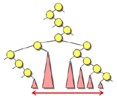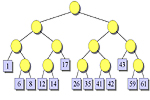| |

|
| |
| Classes |
| |
| |
| 6.046J
Introduction to Algorithms |
|
Teacher: |
Erik Demaine, Shafi Goldwasser |
|
Meeting Time: |
TBA |
| Brief
Description: |
Techniques
for the design and analysis of efficient algorithms,
emphasizing methods useful in practice. Topics: sorting;
search trees, heaps, and hashing; divide-and-conquer;
dynamic programming; amortized analysis; graph algorithms;
shortest paths; network flow; computational geometry;
number-theoretic algorithms; polynomial and matrix
calculations; caching; and parallel computing. Enrollment
may be limited. |
|
URL: |
http://theory.lcs.mit.edu/classes/6.046/spring04/ |
| 18.996
Random Matrix Theory and Its Applications |
|
Teacher: |
Prof. Alan Edelman |
|
Meeting Time: |
M W 9.30 - 11.00 Room 2-338 |
| Brief
Description: |
This
course provides a rigorous introduction to fundamentals
of random matrix theory motivated by engineering and
scientific applications while emphasizing the informed
use of modern numerical analysis software. Topics
include Matrix Jacobians, Wishart Matrices, Wigner's
Semi-Circular laws, Matrix beta ensembles, free probability
and applications to engineering, science, and numerical
computing. Lectures will be supplemented by reading
materials and expert guest speakers, emphasizing the
breadth of applications that rely on random matrix
theory and the current state of the art
Additional topics will be decided
based on the interests of the students. No particular
prerequisites are needed though a proficiency in
linear algebra and basic probability will be assumed.
A familiarity with MATLAB will also be useful.
|
|
URL: |
http://web.mit.edu/18.996/www
|
6.896
Theory of Parallel Hardware |
|
Teacher: |
Prof.
Charles E. Leiserson, Dr. Bradley C. Kuszmaul, Prof.
Michael A. Bender |
|
Meeting Time: |
MW 10-11:30 |
| Brief
Description: |
This
class covers mathematical foundations of parallel
hardware, from computer arithmetic to interconnection
networks. We will focus on the algorithmic underpinnings
of parallel hardware. The topics for the class will
vary depending on student interest, but will likely
include arithmetic circuits, parallel prefix, systolic
arrays, retiming, clocking methodologies, sorting
networks, interconnection networks, hypercubic networks,
P-completeness, VLSI layout theory, reconfigurable
wiring, fat-trees, area-time complexity, and advanced
topics.
The class is suitable for both theory and systems
students. Although it will focus on problem solving,
students will also be exposed to VLSI-layout tools,
such as Magic. M.Eng. students can use the class
to satisfy their Engineering Concentration in either
Theoretical Computer Science or Computer Systems
and Architecture Engineering.
|
|
URL: |
http://theory.lcs.mit.edu/classes/6.896/spring2004
|
18.409
Convex Geometry and Random Walks |
|
Teacher: |
Santosh Vempala |
|
Meeting Time: |
TR 11-12:30, room 2-338 |
| Brief
Description: |
Algorithmic
problems in geometry often become tractable with the
assumption of convexity (e.g. optimization, volume
computation, learning, finding the average etc.).
We will study this phenomenon in depth, beginning
with classical topics such as the Brunn-Minkowski
inequality and Gaussian isoperimetry, and then proceed
to more recent developments in the field of geometric
isoperimetric inequalities (e.g., if you cut a cylinder
into two equal volume parts with a hyperplane, what
is the minimum area of the separation? what is the
maximum?), and their extensions to logconcave functions.
One motivating problem will be that of efficiently
sampling a geometric distribution by a random walk.
Somewhat surprisingly, this problem plays a central
role in the solution of all the algorithmic problems
mentioned above. |
|
URL: |
http://www-math.mit.edu/~vempala/convex/course.html
|
|
*
Please be advised that this is a partial list. Please
refer to Course
6: Electrical Engineering and Computer Science, Course
18: Mathematics or the individual Faculty
homepages for further details. |
|

|

|
|



